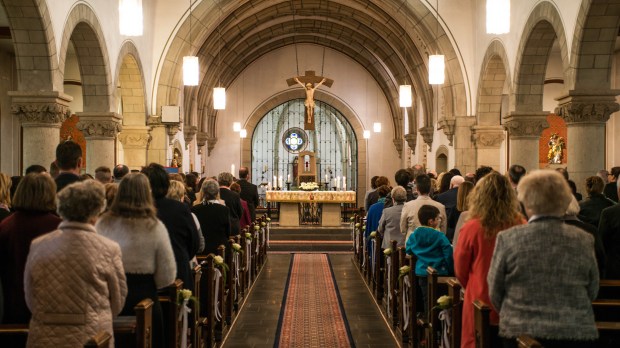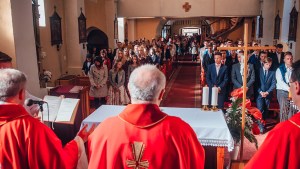Before the reception of holy communion and the reading of scripture, Mass begins with a confession of sins, recognizing our faults before God.
The most common form of this confession is known as the “Confiteor” (“I confess”).
I confess to almighty God
and to you, my brothers and sisters,
that I have greatly sinned,
in my thoughts and in my words,
in what I have done and
in what I have failed to do,[Pray while striking the breast three times.]
through my fault, through my fault,
through my most grievous fault;therefore I ask blessed Mary ever-Virgin,
all the Angels and Saints,
and you, my brothers and sisters,
to pray for me to the Lord our God.
The General Instruction of the Roman Missal explains the reason for this part of the Mass.
[The] purpose [of the Introductory Rite] is to ensure that the faithful, who come together as one, establish communion and dispose themselves properly to listen to the Word of God and to celebrate the Eucharist worthily. (GIRM 46)
This type of public confession of sins has its origin in the Jewish synagogue and was part of early Christian liturgy during the 1st century.
For example, the 1st-century Didache states, “But every Lord’s day gather yourselves together, and break bread, and give thanksgiving after having confessed your transgressions, that your sacrifice may be pure.”
Offering thanksgiving and “breaking bread” can only be done after confessing our sins.
Striking the breast like the tax collector
One of the primary sources for this ancient tradition is the story told by Jesus of the Pharisee and the tax collector.
Two people went up to the temple area to pray; one was a Pharisee and the other was a tax collector. The Pharisee took up his position and spoke this prayer to himself, ‘O God, I thank you that I am not like the rest of humanity—greedy, dishonest, adulterous—or even like this tax collector. I fast twice a week, and I pay tithes on my whole income.’ But the tax collector stood off at a distance and would not even raise his eyes to heaven but beat his breast and prayed, ‘O God, be merciful to me a sinner.’ (Luke 18:10-13)
Which person did Jesus praise?
I tell you, the latter went home justified, not the former; for everyone who exalts himself will be humbled, and the one who humbles himself will be exalted.” (Luke 18:14)
God wants us to have a humble heart and he teaches us through the Mass how to practice that humility.


